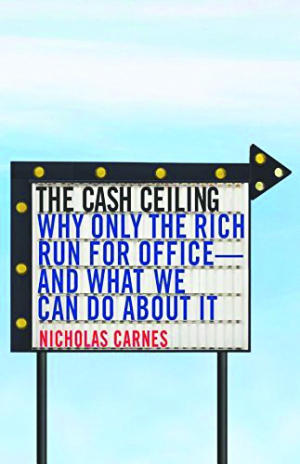The Cash Ceiling
Why Only the Rich Run for Office-and What We Can Do about It
Nicholas Carnes’s The Cash Ceiling aims to answer daunting questions, and skillfully follows through.
Discussions of the lack of class diversity in American political offices are in the spotlight. A focus on inclusion has led to historically underrepresented groups, including women and people of color, gaining more representation. Yet there are barely any working-class people holding office in a country that relies on workers for much of its economic prosperity. In fact, according to Carnes, working-class individuals hold only around three percent of all the political offices in the United States, from local to Supreme Court seats.
The book transforms a flat discourse on economic political diversity into a compelling, lively investigation. As Carnes notes many times, there isn’t enough literature on this problem, its causes, and its solutions. Carnes counters this lack of attention in the crafting of this research-packed work.
The Cash Ceiling is convincing thanks to its well-written arguments, easy-to-understand graphs and data, and moving anecdotes like that of Ruth Ellen Brosseau, a bartender and former teen mom who ran for Canadian parliament and won. The tone is always passionate and persuasive, though it sometimes lapses into repetitive prose. The stance on political parties is neutral; the lack of economic variety in political offices is an issue on both sides of the aisle.
The text expertly analyzes every aspect of the issue at hand, asking why working-class Americans do not run for office in the first place, why they do not get recruited, and so on. It digs at a deeper question, one at the heart of American political philosophy: what’s stopping us from seeing everyone, regardless of class, as capable of holding political office?
Reviewed by
Mya Alexice
Disclosure: This article is not an endorsement, but a review. The publisher of this book provided free copies of the book to have their book reviewed by a professional reviewer. No fee was paid by the publisher for this review. Foreword Reviews only recommends books that we love. Foreword Magazine, Inc. is disclosing this in accordance with the Federal Trade Commission’s 16 CFR, Part 255.

